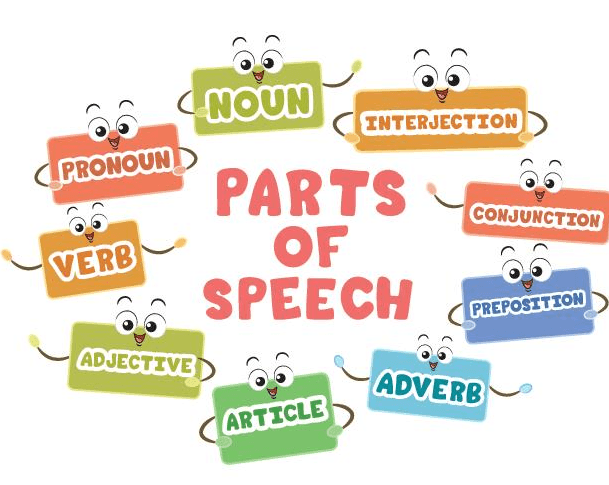
PIG
PRELIMINARY
A. Background
Parts of Speech in English means types of words or word classes. It is called parts of speech because it is parts of speech or parts of a sentence (remember, basically sentences in language are sentences that are spoken, not written down).
So, the words are the "basic ingredients" in a sentence "building", not the "function" of the word in the sentence. Why is that? Because a word can have several (more than one) functions in a sentence.
There are several types of Parts of speech, namely nouns, adjectives, adverbs, pronouns, and so on. Each type has a different meaning and function.
B. Problem Formulation
Based on the above background, the authors formulate several things to be discussed in this paper, namely:
1. Noun
2. Pronouns
3. Verb
4.Adjective
5. Adverb
6.Preposition
7. Conjunction
8. Interjection
C. Purpose of Writing
As for the purpose of writing this paper is to increase our knowledge and our expertise in understanding Parts of Speech.
CHAPTER II
DISCUSSION
A. Definition of Noun
Noun is a word used to name people, objects, animals, places, and abstract concepts. This English noun is one of the eight parts of speech. Apart from being simple (consisting of only one word) these English nouns may take the form of a phrase: noun phrase (thick book).
A noun phrase is a combination phrase between a noun (as the essence) and a modifier. Nouns may also collaborate with other parts of speech to form words with new meanings called compound nouns (waterfall, roadshow).
In a sentence, a noun can function as:
• Subject of a sentence (example sentence: Tommy has run the company since 1993.)
• subject / object complement (example sentence: She is a denstist.)
• direct / indirect object (example sentence: You hit the nail on the head.)
• object of a preposition (example sentence: She was walking on the street when she was attacked.)
1. Types and Examples of Nouns
Kinds and examples of nouns include the following:
• Countable and uncountable Noun: countable is a countable noun (tomato ~ tomatoes, man ~ men), on the other hand, uncountable cannot be counted (cheese, sugar).
• Proper and common nouns: proper is a specific classification of nouns which uses capital letters in the initial letters (Jakarta, Gramedia), while common in general (city, shop).
• Abstract and concrete noun: abstract is a noun that cannot be observed with the five senses (love, romance). In contrast, concrete can be observed with the five senses (book, fluorine).
• Collective noun: to state a group or group name (class, deer).
Noun Substitute
Noun substitute is a construction that functions like a noun. Some examples of sentences are as follows.
• Noun Clause: dependent clause that functions as a noun (The kitten followed wherever the woman went).
• Gerund: bare infinitive + ing (I hate waiting).
• Infinitive: to + bare infinitive (His dream is to win the competition).
2. Definition of Pronouns
Pronouns are words used to replace nouns (nouns) which can be people, objects, animals, places, or abstract concepts. This noun is one of the eight parts of speech.
• Types and Examples of Pronoun Sentences
The following are the types and examples of pronoun sentences along with a brief explanation.
Explanation of Examples of Pronoun Sentences
Personal Pronoun (I, you, they, we, she, he, it, us, her, his, them, mine, yours, its)
Pronouns for specific people, animals, things or things. The form of this pronoun depends on the role (subject, object, possessive), number, person-th, and gender of the noun to be replaced. She prefers to brisk walk to jog.
(He prefers brisk walking over jogging.)
Yours is on the table.
(Yours is on the table.)
Demonstrative Pronoun (this, that, these, those)
Pronouns that use parameternumber (number) and distance (distance). This is the most interesting book I have ever read.
(This is the most interesting book I've ever read.)
Interrogative Pronoun (who, what, which, whose, whom, etc)
Pronouns used to ask questions. Who is that man?
(Who is he?)
Relative Pronoun (who, whose, which, whom, that, etc)
A pronoun that usually begins a relative clause.
The packet, which was sent a week ago, has received.
(The package, which was sent a week ago, has been received.)
Indefinite Pronoun (anything, everything, none, someone, something, etc)
General or non-specific pronouns for people, things, or things. You did everything right.
(You did everything right.)
Reflexive Pronoun (myself, yourself, itself, youselves, himself, herself, ourselves, themselves)



No comments:
Post a Comment